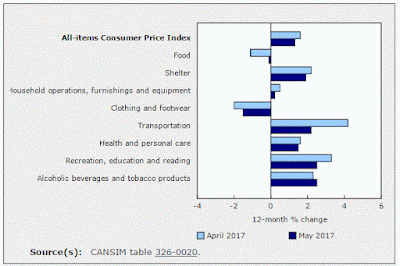Risk And Your Cost Of Living
Last Friday Stats Can reported that our cost of living rose by 1.3% over the 1 year period from last May. As we all know, we don't all necessarily fit into the "basket" of consumer goods that they prescribe to the average Canadian family, but it certainly helps us to make some assumptions. If we look closely at what prices of what goods /services were higher or lower and in what regions (because where you live certainly impacts your cost of living), we can get a reasonable understanding of what the correct assumption might be for extrapolating our cost of living into the future.
When we create our client Wealth Forecast's, we need to make this assumption and it cannot be taken lightly because of the significance of how we see your cost of living growing over a longer term time horizon (and it is why we follow this inflation measurement so closely). Remember, one of our key objectives and the reason we take risk in investing is to outperform the rate of (our own) cost of living (and grow the real purchasing power of our hard earned $). The risk-free (where you are taking no risk at all) rate of return sits at about 1/2% (90 day t-bill), so to get better than inflation returns, we need (at the moment) to get better than 1.5%, which means we need to take risk. The Wealth Forecast allows us to determine how much risk we need to take. Without that, just investing for the sake of investing becomes gambling. A large portion of investors (and many of their advisors), just do not understand how much risk they are taking. We do.
Over the last 5 years, the 1 year moving average for total Canadian CPI has been 1.3%. If you live in a major city, like Toronto or Vancouver, you can likely add another 1/2% -1%.
The 5 year benchmark 60% equity / 40% fixed income (buy and hold) portfolio (60% ACWI ETF / 40% XBB ETF) has returned approx 8%, before fees and taxes.
Take off fees and taxes and it leaves you something in the vicinity of 5% to 5.5% growth. From a conservative perspective, you should be about 2.5% ahead of your cost of living.
Over the last 3 years however, the benchmark 60/40 portfolio has returned only about 4.7% (after fees), so the "real return" of your portfolio may not even be ahead of inflation over this period (even though the 1 year 60/40 return has been closer to 14% after fees).
This is why we focus on the longer-term, because we need to understand the impact of all of the forces that affect your real return over time relative to what your goals are.
Slow global economic growth (and lower total returns) over the last few years has impacted portfolio growth more than it has impacted inflation and is one of the reasons that investors have tried to find better returns, but exposed themselves to excess risk.
Are you comfortable with your level of risk (do you know what it is)?
We will discuss this and other issues that are impacting the management of our clients wealth on our weekly webinar today. The recorded version will be published at or about 5pm EDT.



No comments:
Post a Comment